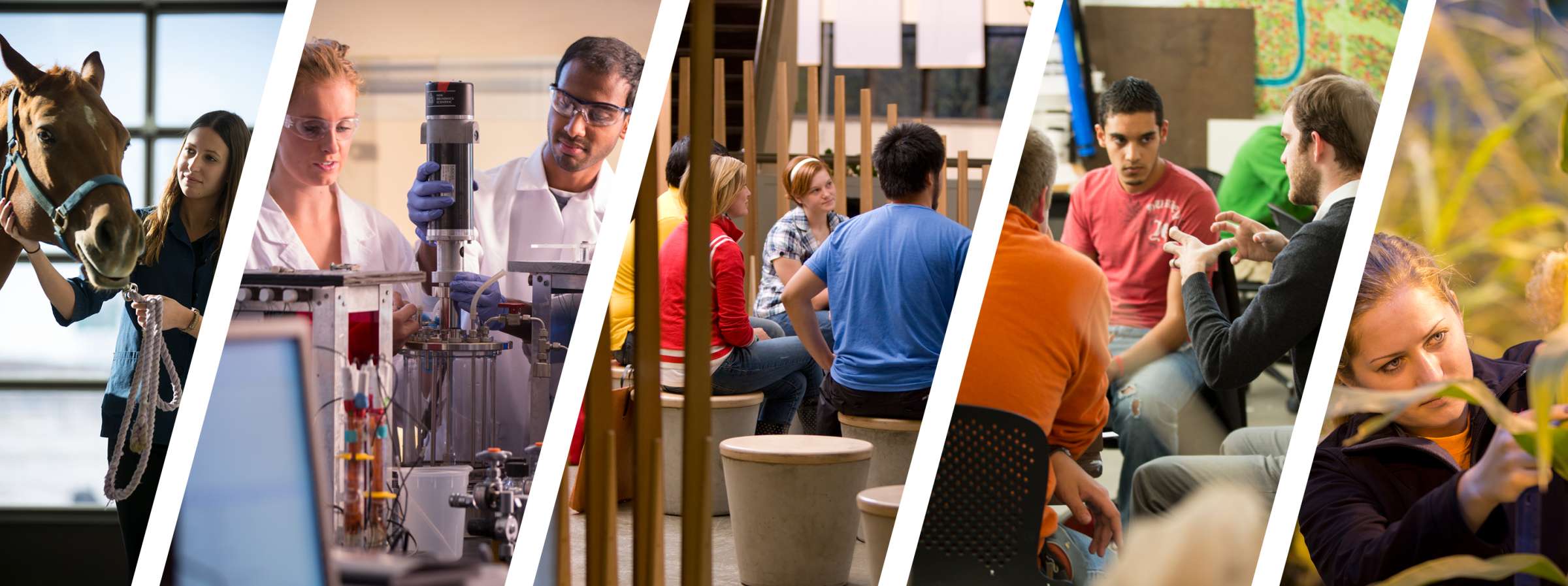At Iowa State, we embrace a vision to be recognized as an international leader in developing and embodying sustainable practices that integrate education and the environment. In commitment to this vision, the university incorporates core environmental concepts throughout the curriculum, promotes environmental literacy among students, faculty and staff, and ensures that campus facilities, policies, planning and management are efficient and environmentally appropriate. A number of innovative programs and initiatives are already in place at ISU. Through their focus on discovery, learning and application, these programs and initiatives address many critical elements of sustainability endeavors--namely the ethical, social, economic and environmental impacts of our actions.
Academics & Research

Academics
Iowa State University is committed to increasing and diversifying student education, awareness and engagement opportunities in sustainability through its curriculum. Our faculty provides a variety of hands-on, interdisciplinary sustainability experiences to students in the classroom, the laboratory, on field trips and through domestic and international travel. Additionally, the Tall Grass Prairie Project provided an annual training workshop that enabled our faculty to infuse sustainability across disciplines and into their curriculum.
Beyond sustainability-based degrees and courses, Iowa State offers students a number of ways to incorporate sustainability into their educational portfolios. More than 90 learning communities provide student-centered programs that deliver engaging experiences about a particular topic. For example, the Science of the Environment and Sustainable Systems Learning Community (SoESS) focuses on the impact of sustainability initiatives on campus, the Ames community and the world. In addition, check out the University Library's Environment and Sustainability Guide to access books, DVDS, online databases and other academic resources that can help in developing papers and projects related to green topics.
Every college at Iowa State University offers courses focused or related to sustainability based upon the following definitions:
- Sustainability-focused courses concentrate on the concept of sustainability, including its social, economic and environmental dimensions, or examine an issue or topic using sustainability as a lens.
- Sustainability-related courses incorporate sustainability as a distinct component or module or concentrate on a single sustainability principle or issue.
The Live Green Sustainability Course Directory (XLSX), an Excel document arranged in alphabetical order by college and department, collects all of Iowa State's sustainability courses into one resource.

Iowa State University offers one undergraduate sustainability major and three undergraduate sustainability minors:
- Environmental Engineering (Major, Civil, Construction and Environmental Engineering)
- Energy Systems (Minor, Mechanical Engineering)
- Sustainability (Minor, Interdisciplinary)
- Wind Energy (Minor, Interdisciplinary)
Iowa State also offers a number of sustainability-focused graduate programs, including:
- Design in Sustainable Environments (Masters)
- Sustainable Agriculture (Masters and Doctorate)
- Urban Design (Masters)
- Wind Energy Science, Engineering and Policy (Doctorate)

Research
Using language from the 1987 Bruntland Commission, Iowa State University defines sustainability research as “research that works to meet the needs of the present without compromising the ability of future generations to meet their own needs.” This definition includes research that focuses on the environmental, social, economic and cultural aspects of sustainability for the purposes of enhancing the quality of life for present and future generations.
In addition to incorporating sustainability-related research opportunities into curriculum, Iowa State has research units in nearly every discipline. In total, 100 research centers and institutes provide engagement opportunities for students, faculty and staff. Ames Laboratory, a federal Department of Energy facility, is also housed at Iowa State. In addition, the Iowa State University Research Park serves businesses of all sizes, including start-ups, small-staff operations, growing entrepreneurial ventures and corporations with multiple locations worldwide.
More than 20% of university faculty members are engaged in sustainability research, collectively representing 95% of Iowa State’s academic departments.
